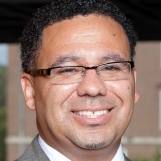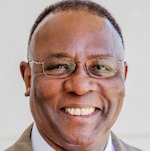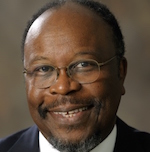 Christopher M. Span is the associate dean for academic programs and an associate professor in the Department of Education Policy, Organization and Leadership at the University of Illinois at Urbana-Champaign. He joined the faculty at the University of Illinois in 2003. Dr. Span holds a bachelor’s degree, a master’s degree, and a Ph.D. in educational policy studies, all from the University of Illinois.
Christopher M. Span is the associate dean for academic programs and an associate professor in the Department of Education Policy, Organization and Leadership at the University of Illinois at Urbana-Champaign. He joined the faculty at the University of Illinois in 2003. Dr. Span holds a bachelor’s degree, a master’s degree, and a Ph.D. in educational policy studies, all from the University of Illinois.Recently, I have been reading about the remarkable accomplishment at Indiana University-Purdue University Indianapolis (IUPUI). Eight African American women earned their doctorate in the College of Education at IUPUI. The “Great Eight” as these women have affectionately been named, have, for very good reasons, captured the headlines of news outlets and social media across the nation. At a time when this nation seems to still have a difficult time successfully matriculating African American students through the educational pipeline, these African American women found a way to not only persevere, but to graduate with the highest degree afforded in higher education. How did they do it? In the words of these women, they formed a “sister circle in the school to strengthen their ties, and developed relationships they all say have been vital to their pending success”
As the associate dean for academic programs in the College of Education at the University of Illinois at Urbana-Champaign, I applaud this accomplishment and am beyond appreciative of the efforts of these women and their college and university. There are few institutions of higher education, particularly at predominantly White institutions, where these kinds of results and accomplishments occur, and these stories should be celebrated (and ideally replicated) for their successes and achievements. That is why I feel compelled to write this story and share upon the success.
At the University of Illinois at Urbana-Champaign, in the College of Education’s Department of Education Policy, Organization and Leadership (EPOL), 12 African American women earned their doctorates this spring; 11 are in the accompanying photograph along with another doctoral recipient from the Department of Curriculum and Instruction.

I’ve affectionately termed these new doctorates: The Talented Twelve.
Two more African American women (one in Curriculum and Instruction, the other in Special Education), nine Latinas, six African American men, and two Latinos earned their doctorates as well. A total of 21 African Americans and 11 Latino/a students earned their doctorate in the college this year, all but six were in EPOL.
In 2015, 14 African Americans, nine females and five males, and three Latinas and two Latinos earned their doctorates in EPOL.
How did the College of Education, particularly the Department of Education Policy, Organization and Leadership (EPOL) achieve these remarkable results? The answer really starts with two individuals: Dr. James D. Anderson and Dr. William T. Trent.
 For over 20 years, James D. Anderson, has been the department head of first Educational Policy Studies (EPS), and thereafter, in 2011, the department head of the merged and reorganized department of Education Policy, Organization and Leadership (EPOL). He is the Edward William and Jane Marr Gutsgell Professor of Education.
For over 20 years, James D. Anderson, has been the department head of first Educational Policy Studies (EPS), and thereafter, in 2011, the department head of the merged and reorganized department of Education Policy, Organization and Leadership (EPOL). He is the Edward William and Jane Marr Gutsgell Professor of Education.
Dr. Anderson is nearing his 50th year at the University of Illinois at Urbana-Champaign. Professor Anderson obtained his baccalaureate at Stillman College, a historically black college in Tuscaloosa, Alabama, and started graduate school in 1966. After the assassination of Dr. Martin Luther King Jr., in 1968, Anderson, as a graduate student, was a member of the campus leadership team that envisioned and implemented Project 500, a campus initiative that lead to the recruitment and enrollment of nearly 700 African American undergraduates to the University of Illinois. Anderson traveled throughout the nation recruiting African Americans students to undergraduate, graduate, and professional programs at the University of Illinois. Few knew then that his efforts, as a graduate student, would turn out to be a continuous longstanding contribution to this campus. Case in point, for the past 20 years, he has either chaired or served on 66 dissertation committees for African Americans and 14 dissertation committees for Latino/a students. In the last 20 years, Dr. Anderson has either sat on or chaired 112 dissertation committees.
 William T. Trent, professor of sociology and director of the Center for Education in Small Urban Communities, came to the University of Illinois at Urbana-Champaign in 1983. In 1966, he earned his baccalaureate degree at Union College in Barbourville, Kentucky. Thereafter, he obtained his doctorate at the University of North Carolina, Chapel Hill. Dr. Trent is beginning his 34th year on the faculty . Between 1994-1999, he was an associate chancellor at the University of Illinois at Urbana-Champaign responsible for campus diversity and inclusion issues. For the past 20 years, Professor Trent has either chaired or served on 58 dissertation committees for African Americans and 12 dissertation committees for Latino/a students. In total, for the past 20 years, Trent has chaired or been a member of 116 dissertation committees.
William T. Trent, professor of sociology and director of the Center for Education in Small Urban Communities, came to the University of Illinois at Urbana-Champaign in 1983. In 1966, he earned his baccalaureate degree at Union College in Barbourville, Kentucky. Thereafter, he obtained his doctorate at the University of North Carolina, Chapel Hill. Dr. Trent is beginning his 34th year on the faculty . Between 1994-1999, he was an associate chancellor at the University of Illinois at Urbana-Champaign responsible for campus diversity and inclusion issues. For the past 20 years, Professor Trent has either chaired or served on 58 dissertation committees for African Americans and 12 dissertation committees for Latino/a students. In total, for the past 20 years, Trent has chaired or been a member of 116 dissertation committees.
Unfortunately, the Graduate College database, where I obtained the doctoral committees that Anderson and Trent have served on, do not go back further than 1995, but their legacy of helping African Americans earn their doctorates dates further back to the beginning of their academic careers. I know at least 10 additional African American and Latino/a doctorates that earned their degrees because of Professors Anderson and Trent prior to 1995. These scholars who have earned their doctorates at the University of Illinois under the direction or mentorship of Dr. Anderson and Dr. Trent have gone on to become provosts, deans, associate deans, professors, vice chancellors, directors of programs, entrepreneurs, principals, superintendents, and leading educators and researchers in their respective fields of teaching, research, discovery, and innovation. Some have founded schools, started not-for-profit organizations, worked for NGOs, and have influenced education policy at the state and federal levels. Some have joined the faculty at their respective institutions and continue the legacy of these two pioneers in identifying, recruiting, mentoring, and graduating outstanding students of color to their colleges, departments, and doctoral programs.
I am one of these individuals. I joined the faculty at the University of Illinois at Urbana-Champaign in spring 2003. Since 2005, I have either chaired or served on 22 dissertation committees for African American students. I have chaired or sat on a total of 41 dissertation committees. As a former doctoral student in EPS and junior faculty member in the College of Education under the guidance of Professors Anderson and Trent, I’ve learned that diversity is not simply a number or concept, but truly a moral imperative and way of life.
One of the greatest strengths of EPS and EPOL under Anderson and Trent’s leadership is their ability to effectively recruit, mentor, and retain high-quality fellowship-earning students from underrepresented backgrounds. For more than 25 years, particularly within the last decade, this has been a foremost departmental priority and the graduates of EPS and EPOL programs have helped to diversify colleges, universities, governmental agencies, and not-for-profit organizations across the nation. Between 2004 and 2009, of the 165 graduate students awarded post-baccalaureate degrees in the department, 42 were African American, 29 were Latino/a, three were Native American, 11 were Asian American, and 112 were women.
Data from the Division of Management Information at the University of Illinois at Urbana-Champaign illustrates that there were 149 students in the department in the fall of 2009. Almost 62 percent of the students enrolled in the department were African American, Native American, or Latino/a and 64 percent of the student body were women. Of these graduate students, 53 were African American, 33 were Latino/a, six were Native American, eight were Asian American, and 18 were international students. Today, of the 520 graduate students in the EPOL, 31.7 percent are from an underrepresented background and 64.8% are women.
James D. Anderson and William T. Trent are without question the primary reason for the recruitment, retention, and graduation of all of these students.
Enhancing the diversity of the faculty is another hallmark achievement. When Dr. Anderson became head of EPS in 1994, there were only eight faculty members in the department. Since the faculty has grown from 8 to 29 and 12 faculty are African American. Every faculty member in the department who has gone up for tenure under Dr. Anderson’s leadership has been promoted. He has worked collaboratively with African American studies, Gender & Women’s studies, Latino studies, Native American studies, and the provost and chancellor’s offices to bring in expert scholars of color across campus. Equally important, both he and Dr. Trent have unofficially mentored countless faculty and administrators as they have navigated their professional spaces on campus. They are both arguably the most selfless individuals I have ever met and believe in the transformative democratizing power of diversity and inclusion.
W.E.B. Du Bois penned a great summary of the efforts of people such as James D. Anderson and William T. Trent when he articulated his sentiments of the concept he coined, the Talented Tenth, and of those who should be the deliverers and advancers of this important development of African Americans. In 1903, Du Bois wrote:
“The Negro race, like all races, is going to be saved by its exceptional men [and I add women]. The problem of education, then, among Negroes must first of all deal with the Talented Tenth; it is the problem of developing the Best of this race that they may guide the Mass away from the contamination and death of the Worst, in their own and other races. Now the training of men [and again I add women] is a difficult and intricate task. Its technique is a matter for educational experts, but its object is for the vision of seers.”
Let me repeat the last line, “Its technique is a matter for educational experts, but its object is for the vision of seers.” The Talented Twelve, and their fellow graduates, are part of a long legacy of purposeful vision, action, expertise, and structural change. Clearly, they are the embodiment of their hard work, grit, and genius, but also of the continual and intentional efforts of “educational experts” and “the visions of seers” from people such as Dr. James D. Anderson and Dr. William T. Trent. Experts determined to ensure that everyone, regardless of their race, gender, religion, socioeconomic status, sexual identity, or age have the opportunity to learn and reach their highest potential. Seers remembered more for the people they include and help, rather than the people they exclude and deny.
Their efforts are just as important as the achievements and accomplishments of all the students we take pride in celebrating this time of the year. Their steadfast efforts should be acknowledged, applauded, and celebrated to ensure everyone knows the remarkable vision, techniques, successes, and progress a handful of dedicated visionary seers, as Du Bois would aptly describe them, can achieve.


As I sat this morning preparing my summer syllabus, I received an email from one of the most dynamic scholars I have ever known. He too is a part of the legacy of the Ujima 520 at the University of Illinois. Provost Rochon is the epitome of everything shared in this dynamic story. He breathes and lives the totality of what collective work and responsibility embody.
Thank you Dr. Span. This is just what I needed this morning. This article will be a part of my summer course, and most important, it will be a part of my soul, my work ethic and action, from this day forward. Yesterday I attended a meeting with an African American junior professor who did not receive tenure. As we reflected on the last six years of her life, it became even more clear to me how I fell short in supporting a dynamic young scholar. My efforts did not do what Ujima demands. We were not successful at my university because the purposeful mentoring and support of this individual was not done in the tradition of Dr. James Anderson and Dr. Bill Trent. Shame on me, because through Provost Rochon, I have not only heard about that tradition, I have benefited from that tradition as a result of his mentorship.
As the tears stream down my face at this moment, they are tears of sadness, motivation, and today, empowerment. Never again! Never again will I be a part of what I put forth, witnessed and experienced in my fragmented mentoring of the young sister who did not receive tenure at my university. When I meet with a new cohort of doctoral students on this Saturday morning, I will teach and mentor catastrophically, especially to those who are developing scholars of color. I believe the words of Dr. DuBois. African American children do have “a right to know, to think, and to aspire.” In order for those rights to be made a reality, we must have scholars who will construct and facilitate the journey. Thank you, Dr. DuBois. I will not “falter;” I will not “shrink.” I will be a part of a “legacy of purposeful vision, action, expertise, and structural change” at Texas A&M University. Thank you again Dr. Span.
Thank you for the very kind words and for sharing your deep reflection and commitment to the advancement of anyone striving to better themselves. Provost Ron Rochon has been a mentor to me as well; he too is simply a remarkable example to follow.
I wish you only the best in your future endeavors, and keep in mind that we may not always win every battle, but it is important we stay focused and dedicated to winning the ultimate prize: progress and equity…for everyone.
As one of the members of Jim Anderson’s crew (2001) this article made me re-member how he made it possible for my life to change in ways, I still can’t believe. No one in my family (to date) on either side has ever earned a Ph.D., but I can’t tell you how many of my family have attend college and earned at minimum undergraduate degrees since I graduated from UIUC. I still remember my interview with Jim and my time as an EPS grad student was one of the major blessings in my life. Since graduating I continue to do my best to speak out,write out, shout out against racism and all isms, reach out and help any Black person I can including encouraging them to pursue their dreams and to help make this world a better place by working for equity and justice for all. Thanks for writing this Chris, well said. Not sure if this is still true but they used to call EPS its own HBCU—proud to be a member of that group. Peace, Mary
Although I had only met him once, I am the proud “next generation” of Dr. Anderson’s doctoral graduates. My dissertation chair, mentor and academic hero, Dr. Stafford Hood (Professor Curriculum & Instruction and Educational Psychology, University of Illinois at Urbana Champaign and CREA Director) often shared the philosophy and ethical standards that Dr. Anderson instilled in him. Many of these I have not only used in my work with students, but in mentoring other students of color to see achievement as a collectivistic mandate.
Thank you, All, for acknowledging the importance of heralding these men’s inter generational contributions that continue to serve as examples to the communities in which they invested their talent and treasure(s)!
Congratulations to Drs. Anderson and Trent, and to their students. The praise offered by Dr. Span and in the comments above is well deserved by these two excellent scholars.
However, in my opinion, the “talented tenth” framing is problematic, even to the degree that Dr. DuBois abandoned it. In addition, even though we should respect our history and historical figures, we also need to recognize that new forms of leadership are necessary as we move forward. Locating leadership in charismatic individuals or over-privileging those in the academy will not serve us well.